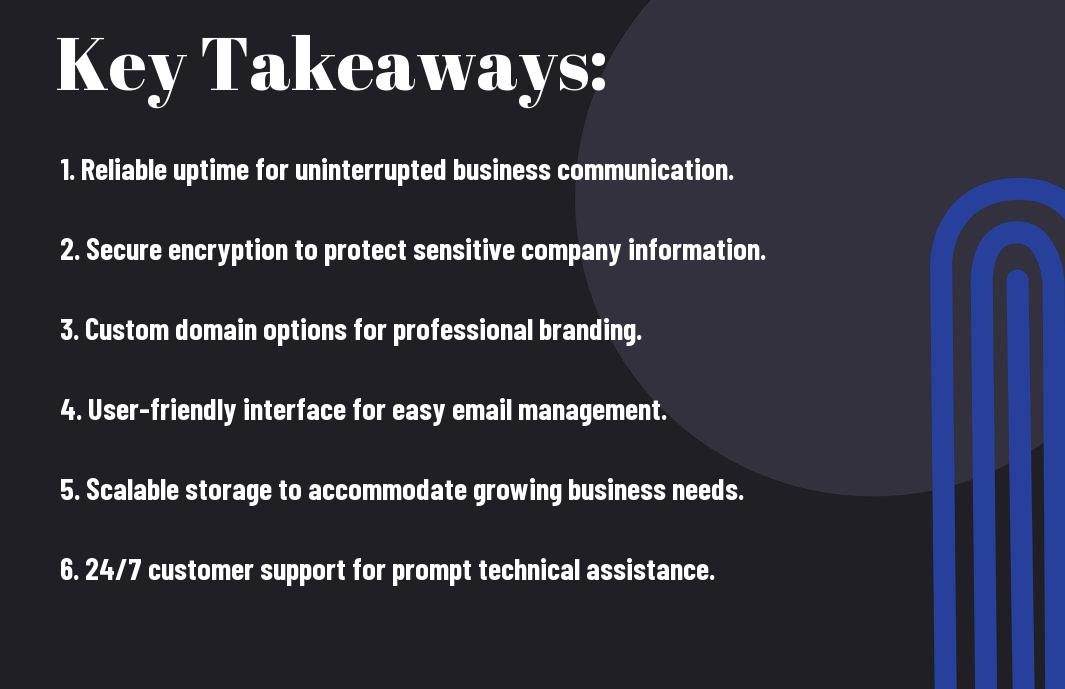Perplexed by the myriad of options available for email hosting services for your business website? Look no further, as we have compiled a list of the most reliable, secure, and efficient email hosting services for your business needs. Your choice of email hosting service can have a significant impact on the success of your business, affecting everything from communication efficiency to data security. With so much at stake, it’s crucial to make an informed decision when selecting an email hosting service for your business website. You deserve a service that is reliable, affordable, and provides excellent customer support. In this post, we will guide you through the top email hosting services, allowing you to make the best choice for your business.
Key Takeaways:
- Email Hosting Services are crucial for businesses to maintain a professional image and have reliable communication tools.
- Security is a top priority when choosing an email hosting service, as sensitive business information needs to be protected from cyber threats.
- It’s important to consider the scalability and customer support offered by email hosting services, to ensure they can grow with your business and provide assistance when needed.

Top Email Hosting Services
Assuming you are looking for the best email hosting service for your business website, there are several options to consider. In this chapter, we will highlight some of the top email hosting services that offer a range of features to meet your business needs.
Google Workspace: Comprehensive Collaboration
If you are looking for a comprehensive collaboration platform, Google Workspace is a top choice for your business. Formerly known as G Suite, Google Workspace offers a suite of productivity and collaboration tools, including Gmail, Google Drive, Google Docs, and Google Meet. With Google Workspace, you can easily communicate and collaborate with your team members, store and share files, and conduct virtual meetings. The platform also offers robust security features to protect your business data.
Microsoft 365: Integrated Productivity Solutions
Microsoft 365, formerly known as Office 365, is another top email hosting service that provides integrated productivity solutions for your business. With Microsoft 365, you get access to popular Microsoft applications such as Outlook, Word, Excel, and PowerPoint, as well as communication and collaboration tools like Microsoft Teams and OneDrive. The platform offers seamless integration with other Microsoft services, making it a convenient choice for businesses that are already using Microsoft products.
Zoho Mail: Privacy-Focused Email Hosting
Zoho Mail is a privacy-focused email hosting service that offers a range of features to meet your business email needs. With Zoho Mail, you can create a professional email address using your own domain, access emails from a clean and ad-free interface, and take advantage of features such as email filtering and email forwarding. Zoho Mail also prioritizes your privacy and security, offering strong encryption and advanced spam filtering to protect your sensitive data.
Features to Consider
Unlike the variety of email hosting options available for personal use, choosing the best email hosting service for your business website requires careful consideration and the assessment of several critical features. In this chapter, we will discuss the key features you should consider when selecting an email hosting service for your business.
Storage and Scalability
When selecting an email hosting service for your business website, storage and scalability are vital considerations. You need to ensure that your email hosting provider offers sufficient storage to accommodate your current email usage while also allowing for future growth. Additionally, look for a provider that offers scalable plans, allowing you to easily upgrade or downgrade your storage capacity as your business needs change.
Security and Reliability
Your business emails contain sensitive information, making security and reliability non-negotiable features when choosing an email hosting service. You need a provider that offers robust data encryption, spam and virus protection, and reliable uptime guarantees. Your email host should also include regular backups and disaster recovery solutions to protect your data in the event of an unforeseen incident.
User Experience and Accessibility
When evaluating email hosting services, user experience and accessibility play a crucial role in your decision-making process. You want a platform that not only offers a user-friendly interface but also provides accessibility across multiple devices and operating systems. This ensures that you and your team can access your business emails seamlessly, regardless of your location or device.
Compatibility and Integration
Lastly, consider the compatibility and integration of the email hosting service with your existing business tools and software. You should look for a provider that seamlessly integrates with your preferred email clients, productivity apps, and customer relationship management (CRM) software. This ensures that your email hosting service complements and enhances your existing workflow, rather than creating obstacles.
When selecting an email hosting service for your business website, it’s essential to consider various features that directly impact the efficiency, security, and scalability of your email communication. By carefully assessing the storage and scalability, security and reliability, user experience and accessibility, and compatibility and integration of each email hosting provider, you can make an informed decision that best meets the unique needs of your business. For more information on the best email hosting providers of 2023, check out this comprehensive guide from TechRadar.

Pricing and Plans
Now, when it comes to selecting an email hosting service for your business website, it’s crucial to consider the pricing and plans offered by the providers. You want to ensure that you are getting the best value for your money while also receiving the features and capabilities that are essential for your business. You can find a comprehensive comparison of the 5 best email hosting services of 2023 in this Forbes article.
Understanding the Cost-Benefit Analysis
When evaluating the pricing and plans of email hosting services, it’s important to conduct a cost-benefit analysis to determine the overall value each provider offers. Consider the features and capabilities included in each plan, as well as the potential for scalability and growth. Remember, the cheapest option may not always be the most cost-effective in the long run, so be sure to weigh the benefits against the costs.
Comparing Subscription Models
Another crucial factor to consider when evaluating pricing and plans is the subscription models offered by the email hosting service providers. Some providers offer tiered pricing, while others may have a pay-as-you-go model. You need to carefully analyze which subscription model aligns with your business’s needs and budget. Here’s a simple breakdown to help you compare the various subscription models:
| Tiered Pricing | Offers different levels of service at different price points, allowing you to choose the features that best suit your needs. |
| Pay-As-You-Go Model | Charges you based on your usage, providing flexibility but may end up costing more if your usage exceeds the expected levels. |
Setting Up Your Email Hosting Service
After researching the best email hosting company for your business, it’s time to set up your email hosting service. This involves a few important steps to ensure that your email system is configured correctly and ready for use.
Domain Configuration and Verification
Once you’ve chosen an email hosting service, the first step is to configure and verify your domain. This involves updating your domain’s DNS settings to point to your email hosting provider and verifying ownership of the domain. This process may vary depending on your hosting provider, but it’s crucial to follow the specific instructions provided to ensure that your emails are properly routed to the correct server.
Creating User Accounts and Managing Settings
With your domain configured, the next step is to create user accounts for your email domain. This includes setting up email addresses for your employees or team members and configuring their access and permissions. You’ll also need to manage settings such as email storage, security protocols, and spam filters to ensure that your email system is secure and efficient.
Email Migration and Support
If you’re transitioning from an existing email hosting service or migrating from a different email provider, you’ll need to plan and execute the migration process carefully. This may involve importing existing emails and contacts, updating email client settings, and ensuring a smooth transition for your team. Additionally, it’s important to have access to reliable support from your email hosting provider in case you encounter any issues during the setup and migration process.
Setting up your email hosting service requires attention to detail and a clear understanding of your hosting provider’s requirements. By following the steps outlined above, you can ensure a smooth and successful setup process for your business email system. Remember to carefully configure your domain, manage user accounts and settings, and plan for a seamless migration to your new email hosting service. With the right preparations and support, you can establish a secure and reliable email system for your business.
The Best Email Hosting Services for Business Websites
Presently, it is clear that choosing the right email hosting service is crucial for the success of your business website. You want a service that is reliable, secure, and customizable to fit the unique needs of your organization. After reviewing the top email hosting services, it’s important for you to consider factors such as storage capacity, security features, ease of use, and customer support. You need a service that can handle the demands of your business and help you communicate effectively with your customers. With the right email hosting service in place, you can streamline your business operations and ensure that your website and communications are running smoothly.
FAQ – The Best Email Hosting Services for Business Websites
Q: What are the benefits of using a professional email hosting service for a business website?
A: Professional email hosting services offer enhanced security, reliability, and customization options compared to free email providers. They also provide a more professional appearance with custom domain email addresses, and often include additional features such as calendar integration and file storage.
Q: What should I look for when choosing an email hosting service for my business website?
A: When selecting an email hosting service for your business website, it is important to consider factors such as uptime reliability, security measures, storage limits, customer support, user interface, and any additional features or integrations that may be beneficial for your business needs.
Q: What are some of the top email hosting services available for business websites?
A: Some of the top email hosting services for business websites include Microsoft 365, Google Workspace, Zoho Mail, Rackspace Email, and Intermedia Exchange Email. Each of these services offers a range of features and pricing options to suit different business requirements.
Q: How can I migrate my current email accounts to a new hosting service?
A: Migrating email accounts to a new hosting service can typically be done using the built-in tools provided by the new hosting service, or with the assistance of their customer support team. It is important to follow best practices to ensure a smooth transition and minimal disruption to your business operations.
Q: What are some key security considerations when using an email hosting service for a business website?
A: Key security considerations for email hosting services include encryption protocols for data transmission, spam and malware filtering, two-factor authentication options, regular security updates, and compliance with data protection regulations such as GDPR. It’s important to prioritize the security of your business’s sensitive information and communications.
CATEGORY:Web Hosting

